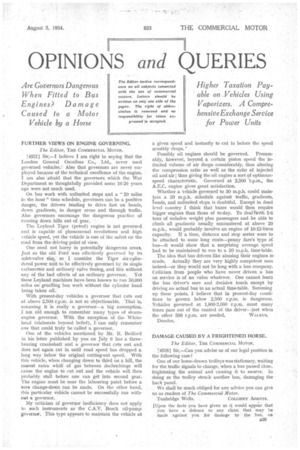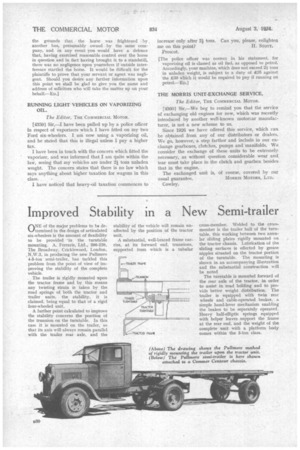OPINIONS and QUERIES FURTHER VIEWS ON ENGINE GOVERNING.
Page 41

Page 42

If you've noticed an error in this article please click here to report it so we can fix it.
The Editor, THE COMMERCIAL MOTOR,
143571 believe I am right in saying that the London General Omnibus Co., Ltd., never used governed vehicles. Also that governors are never employed because of the technical excellence of the engine. I am also 'afraid that the governors which the War Department so thoughtfully provided some 16-20 years ago were not much used.
On bus work with unlimited stops and a " 20 miles in the hour" time schedule, governors can he a positive danger, the drivers tending to drive fast on bends, down gradients, in danger areas and through traffic. Also governors encourage the dangerous practice of running down hills out of gear. '
The Leyland Tiger (petrol) engine is not governed and is capable of phenomenal revolutions and high 'vehicle speed, yet the vehicle is one of the safest on the road from the driving point of view.
One need not hurry in potentially dangerous areas. Just as the old Ford was effectively governed by its inlet-valve s.i„ so, I consider the Tiger six-cylintiered power unit to be effectively governed by its single carburetter and ordinary valve timing, and this without any of the bad effects of an ordinary governor. Yet these Leyland machines have been known to run 50,000 miles On gruelling bus work without the cylinder head being taken off.
With present-day vehicles a governor that cuts out at above 2,500 r.p.m. is not so objectionable. That is, assaming it is really a governor—a big assumption. I am old enough to remember many types of steamengine governor. With the exception of the Whitehead (elaborate beyondbelief), Ican only remember one that could truly be called a governor.
One of the vehicles mentioned by Mr. R. Bedfoad in his letter published by you on July 6 has a threebearing crankshaft and a governor that cuts out and does not again cut in until road speed has dropped a long way below the original cutting-out speed. With this vehicle, when changing down to third on a hill, the merest extra whiff of gas between declutchings wilt cause the engine to cut out and the vehicle will then probably stall before one can get into second gear, The engine must be near the labouring point before a sure change-down can be made. On the other, hand, this particular vehicle cannot be successfully run without a governor.
• My criticism of governor inefficiency does not apply to ,such instruments as the C.A.V. Bosch oil-pump governor. This type appears to maintain the vehicle at a given speed and instantly to cut in before the speed sensibly drops.
Possibly oil engines should be governed. Presumably, however, beyond, a certain piston speed the inducted volume of air drops' considerably, thus altering the compression ratio as well as the ratio of injected oil and air ; thus giving the oil engine a sort of optimum' speed characteristic. Governed at 2,500 the A.E.C. engine gives great satisfaction.
Whether a vehicle governed to 30 m.p.h. could maintain a 20 m.p.h. schedule against traffic, gradients, tends, and unlimited stops is doubtful. Except in dead level country I think that buses would then require bigger engines than those of to-day. To dealt-kith 5-6 tons of unladen weight plus passengers and be able to climb all gradients usually encountered at above 20 m.p.h., would probably involve an engine of 10-12-litres capacity. If a time, distance and stop meter were to be attached to some long route—penny fare's type of bus—it would show that a surprising average speed had to be maintained to run to a 20 m.p.h. time-table.
The idea that bus drivers like abusing their engines is crude. Actually they are very highly competent men indeed—or they would not be long with a bus company. Criticism from people who have never driven, a bus on service is of no value whatever. One cannot learn the bus driver's sure and decisive touch except by driving an actual bus to an actual time-table. Summing up these points, I believe that in present-day conditions to govern below 2,500 r.p.m. is dangerous. Vehicles governed at 1,800-2,000 r.p.m. must many times pass out of the control of the driver—just when the other 500 r.p.m. are needed. WALRUS. Dundee.
DAMAGE CAUSED BY A FRIGHTENED HORSE.
The Editor, THE COMMERCIAL MOTOR.
143581 Sir,—Can you advise us of our legal position in the following case?
One of our horse-drawn trolleys was stationary, waiting for the traffic signals to change, when a bus passed close, frightening the animal and causing it to swerve. In doing so the trolley struck another bus, damaging the back panel.
We shall be much obliged for any advice you can give us as readers of The Commercial Motor.
Tunbridge Wells. COLLIERY AGENTS.
[Upon the facts you have given us it would appear that you have a defence to any claim that may be made against you for damage to the bus, on F29
the grounds that the horse was frightened by another bus, presumably owned by the same company, and in any event you would have a defence that, having exercised reasonable control over the horse in question and in fact having brought it to a standstill, there was no negligence upon yourselves if outside interference startled the horse. It would be difficult for the plaintiffs to prove that your servant or agent was negligent. Should you desire any further information upon this point we shall be glad to give you the name and address of solicitors who will take the matter up on your behalf .—ED.]
RUNNING LIGHT VEHICLES ON VAPORIZING OIL.
The Editor, THE COMMERCIAL MOTOR.
[4359] Sir,—I have been pulled up by a police officer in respect of vaporizers which I have fitted on my two Ford six-wheelers. I am now using a vaporizing oil, and he stated that this is illegal unless I pay a higher tax.
I have been in touch with the concern which fitted the vaporizer, and was informed that I am quite within the law, seeing that my vehicles are under 2 tons unladen weight. The concern states that there is no law which says anything about higher taxation for wagons in this class. .
I have noticed that heavy-oil taxation commences to increase only after 21 tons. Can you, please, enlighten
me on this point? H. STOTT. Prescot.
[The police officer was correct in his statement, for vaporizing oil is classed as oil fuel, as opposed to petrol. Accordingly, your machine, which does not exceed 2).t tons in unladen weight, is subject to a duty of £35 against the :£30 which it would be required to pay if running on petrol.—ED.]
THE MORRIS UNIT-EXCHANGE SERVICE.
The Editor, THE COMMERCIAL MOTOR.
[43601 Sir,—We beg to remind you that the servke of exchanging old engines for new, which was recently introduced by another well-known motorcar manufacturer, is not a new scheme to us.
Since 1926 we have offered this service, which can be obtained from any of our distributors or dealers. We go, however, a step farther and include in our exchange gearboxes, clutches, pumps and manifolds. We consider the exchange of these units to be extremely necessary, as without question considerable wear and tear must take place in the clutch and gearbox besides that in the engine.
The exchanged unit is, of course, covered by our usual guarantee. MORRIS MOTORS, LTD. Cowley.






















































































